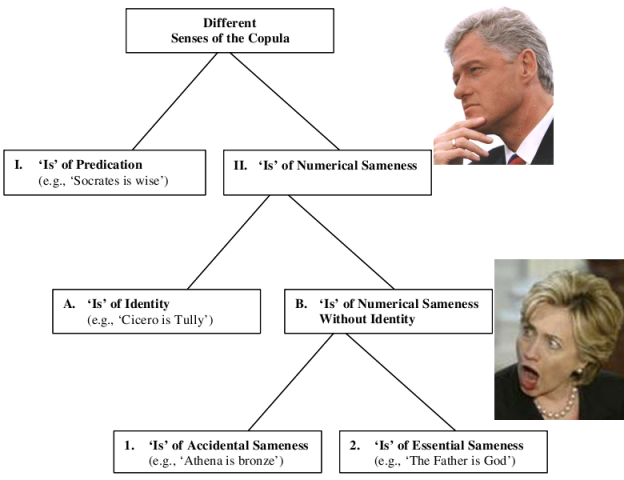As easy answer to: What is “the” Trinity doctrine?
“The Trinity doctrine, at least for orthodox Christians, is found in the seven ecumenical councils.”
“The Trinity doctrine, at least for orthodox Christians, is found in the seven ecumenical councils.”
An appealing theological option which is neither Nicene nor “Arian”?
“…earliest believers treated the risen/exalted Jesus as they did only because they felt required to do so by God.”
 Were there any “biblical unitarians”, or what I call humanitarian unitarians in the early church?
Were there any “biblical unitarians”, or what I call humanitarian unitarians in the early church?
Buckle your seatbelts – this post isn’t a quickie.
First, to review – in this whole debate, Burke has argued that all the NT writers were humanitarians. But if this is so, one would expect there to be a bulk of humanitarian unitarians in the times immediately after the apostles. Here, as we saw last time, Bowman pounces. All the main 2nd century theologians, he urges are confused or near trinitarians. (Last time, I explained that this is a dubious play on the word “trinitarian”. My term for them is non-Arian subordinationists.) There’s not a trace, Bowman urges, of any 1st c. humanitarians – with the exception of some off-base heretical groups, like the Ebionites.
We’re talking about mainly the 100s CE here, going into the first half of the 200s. The general picture, as I see it, is this. Early in the century, we find the “apostolic fathers” basically echoing the Bible, increasingly including the NT (the NT canon was just starting to be settled on during this century). However, some of them seem to accept some kind of pre-existence for Christ (in God’s mind? or as a divine self alongside God?), and they’re often looser, more Hellenized in their use of “god” (so even though as in the NT the Father is the God of the Jews, the creator, Jesus is more frequently than in the NT called “our God” etc.) But clearly – no equally divine triad, no tripersonal God, and in most, no clear assertion of the eternality of the Son. In the second half of the century, starting with Justin Martyr, we find people expounding a kind of subordinationism obviously inspired by Philo of Alexandria, the Jewish Platonic theologian Read More »SCORING THE BURKE – BOWMAN DEBATE – ROUND 5 – BURKE – Part 3
I’ve blogged about these folks before. I do not enjoy criticizing apologists, because I think Christian apologetics is important. And the folks at Credo House Ministries seem like good-hearted and hard working Christians who are doing their best to help Christians love God with their minds. And I think Patton is an excellent blogger and writer. But I feel compelled to correct some of their… Read More »Credo House Ministries’ Inaccuracies about the Trinity and the Council of Nicea
After what has been said in the foregoing pages, we are prepared to re-assert, in conclusion, that the modern doctrine of the Trinity is not found in any document or relic belonging to the church of the first three centuries. Letters, art, usage, theology, worship, creed, hymn, chant, doxology, ascription, commemorative rite, and festive observances, so far as any remains, or any record of them… Read More »the concept of a triune God an anachronism in the first three centuries
We had our first post here or 6 / 19 / 06 – over 350 posts ago! Thus, we are 5. Ready for Kindergarden, evidently! 😉 Many thanks to J.T. Paasch, Scott Williams, and Joseph Jedwab for their excellent posts! And thanks to the many great commenters here; we’ve had some vigorous discussions, and only very rarely have things gotten a bit too “hot.” You folks are awesome. A… Read More »trinities turns 5
 The latest Christianity Today magazine features an article entitle “Faith-Based Fracas”, by free-lance reporter Bobby Ross Jr. The main interest of the piece is whether or not it will remain legal for religious organizations to hire and fire on the basis of religious beliefs.
The latest Christianity Today magazine features an article entitle “Faith-Based Fracas”, by free-lance reporter Bobby Ross Jr. The main interest of the piece is whether or not it will remain legal for religious organizations to hire and fire on the basis of religious beliefs.
For the record: I support that right.
But the piece is occasioned by a current lawsuit against evangelical charity World Vision brought by three recently fired employees.
It strikes me that there are human and theological angles to this story which have yet to be told.
Here are the relevant bits from Ross’s story in CT:
Both [Sylvia Spencer and Vicki Hulse] signed statements affirming their Christian faith and devoted a decade to World Vision… But in November 2006, they and colleague Ted Youngerberg were fired. Their offense, as determined by a corporate investigation: The three did not believe that Jesus Christ is fully God and a member of the Trinity. (Bobby Ross Jr., “Faith-Based Fracas”, Christianity Today, June 2010, 17-21, p. 17, emphases added)
No doubt the reporter here was hindered by the fact that a lawsuit is underway. But the story has many obvious, yawning gaps:Read More »No Trinity, No Job – Part 1
Let’s define “Jesus is God” to mean one or more of these: Jesus is numerically identical to the one God, YHWH, or Jesus fully possesses the divine nature of the one God, or Jesus is one “divine person” within the one God. The New Testament gospels are centrally concerned with Jesus, and with the one God. But how do they relate the two – or… Read More »Do the Gospels disagree about Jesus and God? Part 1 – Three Options
Is “the doctrine of the Trinity” essential to salvation? To Christianity?
Trinitarian theology is not served by sophistry, cheerleading, or ignoring relevant work. In this episode, I discuss five more apologetics face-plants about the Trinity.
Is this a powerful, state-of-the-art biblical argument for the Trinity?
I first encountered Sir Anthony Buzzard (yes, he’s a real “Sir”, and his wife Barbara a “Lady”) in the endnotes of Dallas Willard’s The Divine Conspiracy. Willard had referred to his short book The Coming Kingdom of the Messiah. Buzzard and Willard have in common a deep grasp of the good news of the Kingdom as preached by Jesus, and the centrality of God the Father to… Read More »podcast 44 – The Spiritual Journey of Sir Anthony Buzzard
Is the Son God? In the immortal words of Bill Clinton, “It depends on what the meaning of the word ‘is’ is.” Brower and Rea suggest the following classification of meanings of “is” (in logic, “is” is called “the copula” – that which connects the subject and what’s being said of that subject).

Um, no the Clintons aren’t in the original chart in their paper (71).
And yes, Bill is intrigued by the word “copula”. Read More »Constitution Trinitarianism Part 3: The Meaning of “Is”
Brian Leftow is recognized as one of the most important living Christian philosophers. Formerly of Fordham University in NYC, he now holds the prestigious Nolloth Chair of the Philosophy of the Christian Religion at Oriel College, Oxford. See Trent Dougherty’s comments here for a list of some of his publications. In person, Leftow is very pleasant and interesting, and his sense of humor also comes… Read More »Leftow 1: “Anti Social Trinitarianism”
Is reforming in light of scripture only acceptable in the distant past?